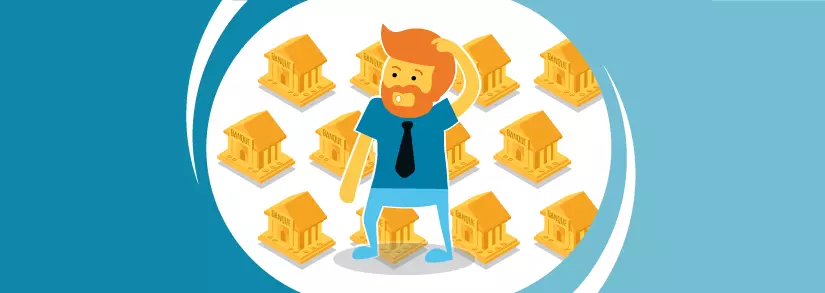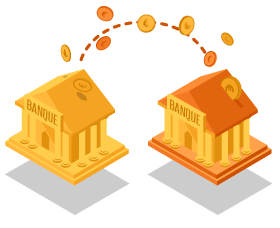French Bank Accounts: Types and Offers in 2021

Want to subscribe to a French energy offer?
Our English-speaking Selectra advisors are here to help you find the right energy plan.
(foreign IBANs accepted) at [email protected]. You can contact us also:

As an expat or an exchange student, opening a French bank account, or "compte bancaire", will probably be on your top priority list when you move to France. If this process feels difficult for you, as a non-French person, this guide is here to shed light on the different types of bank accounts in France and how to open one as a foreigner.
- To sum things up
- There are 3 types of banks accounts in France, the main one being the "compte courant".
- You can definitely open a French bank account as a non-resident, but conditions apply.
- If you are denied an account by French bank, the "droit au compte" process guarantees you the right to an account somewhere else.
- Make sure to read and understand all the T&Cs of a bank convention before signing up.
The types of French bank accounts
There are quite a few different types of bank accounts, each with a specific purpose. They can be classified into 3 categories:
- The classic account, through which you can manage everyday finances. It can be named current account, checking account, or deposit account (in French: "compte courant", "compte à vue", "compte chèque" or "compte de dépôt"). If you are opening a bank account in France, chances are this is the one you will most likely need.
- The savings account ("compte épargne"), which offers the advantage of producing interest. It includes:
- Passbook savings account (known in French as "Livret A", "Livret Jeune", Popular savings account, etc.)
- Accounts for industrial development ("Codevi" in French)
- Housing Savings Plans ("ELP") and Home Savings Accounts ("CEL")
- Retirement savings plans ("PERP" or "Perco" in France)
- the securities account for investment products on the stock market (purchase of SICAVs, shares, bonds, etc.) and the stock savings plan (PEA).
We can also classify bank accounts according to their nature:
- Individual accounts, i.e. a bank account belonging to a single person
- Joint accounts, which belong to 2 people (where co-owners are jointly liable for the account)
- Undivided account, which are collective bank accounts from which no transaction can be made without the signature of all co-holders. As with joint accounts, all co-holders are jointly liable for the account
- Term accounts, where the holder sets a certain period during which he or she will not use the deposited money, in exchange of a higher remuneration. With this type of account, however, withdrawal of funds prior to the set date will result in a penalty.
It's good to know that you are allowed to open several types of accounts in one of several bank establishments if you wish!
French bank accounts for non-residents
If you live in France or visit France regularly, but have your main residence in another country (the one in which you pay taxes), then you will be classified as a "non-résident". This will be your situation if you are an expat, an exchange student, a worker travelling to France regularly for business, a non-French person living with a French partner in France... This status doesn't mean you can't still open a French bank account as a non-resident and on the contrary, we encourage you to do so in order to avoid paying extortionate fees when you withdraw money or pay by card, especially if you are moving to France from outside the EU.
Find out all about French bank accounts for non-residents in this dedicated article.
Both traditional banks (such as HSBC or the Société Générale) and online banks (such as N26) can offer French bank accounts for non-residents, on the condition that you meet the same eligibility requirements as asked for French residents.
You are required to notify your bank of your status upon signing up. Note that, as a non-resident, you will be able to open a checkings account and the French "Livret A" account, as well as set up term deposits, but some types of accounts will be denied to you, such as the "Livret Jeune", the "Livret de Développement Durable" and the "Livret d'épargne populaire", all reserved to French-residents.
A great option if you don't live in France permanently is HSBC. Indeed, not only does the bank offer non-residents accounts, but it also offers its services in English, including customer service. You can carry out all procedures online, making it easy to manage your finances at all time, in France or abroad.
Banking in France 101

First things first, let's look into the definition of the term.
A French bank account, or "compte bancaire" in French, actually has several definitions, because it actually is associated with several different French banking products and objectives. In everyday language, we usually assimilate the term of a bank account to a current account, which is the most common type of account and is used to centralise your standard debit and credit banking transactions.
It will be important for you to open a current account in France, known as "compte courant", in order to make money deposits and to pay your utility bills. It will come with a French-formatted IBAN.
In France, you can open a current account if you are over 18 (over 16 for a savings account), have a valid ID and a proof of permanent French residence. The account can be both personal or collective. If for whatever reason a bank refuses to open an account for you, you can resort to your right to an account as detailed below.
The right to an account, or "droit au compte"
The French "droit au compte" was created in order to limit financial exclusion for more modest households, a phenomenon which occurs when multiple banks refuse to grant an account to an individual. Being unable to open a bank account can be truly handicapping as it prevents a person from managing their finances and making deposits or transactions. The issue is that banks in France don't have to give a justification to the reason why they turn down a request to open an account.
If this happens to you and that you find that more than one French bank refuses to let you open an account with them, then you can apply this right to an account if you're an official French resident or if you're an EU citizen. To use your right to a bank account, either you or the bank which rejected you need to formulate a request to the Banque de France.
The Banque de France then nominates a banking establishment which will be under obligation to take you up as its client. You will be able to benefit from the standard minimum banking services, in order to manage your finances, including:
- A payment bank card with systematic authorisation
- 2 cheques per month
- An annual change of address
- A monthly bank account statement
- Remote consultation of your current account
- Cash deposits and withdrawals at your bank establishment counter
- The deposit of transfers and cheques
- Bank transfers, debits and interbank securities.
Although you get access to a bank account thanks to the droit au compte, this doesn't entitle you to hold a cheque book, nor does it allow you overdrafts.
Bank account convention, or "convention de compte" in France

Upon opening your account, you will sign a "convention de compte" which binds you and your bank. Under banking in France rules, this convention includes:
- The general conditions of opening, transferring and closing the current account
- The operating rules of the current account, the use of means of payment and the authorised bank overdraft
- The rates associated with the bank account's operation
- How interest expense and value dates will be calculated
- The steps to follow in the event of an operating incident
- What would happen to the current account in the event of the death of the holder
- What would happen in case of bankruptcy appeal or in the event of a dispute between the two parties.
If you aren't comfortable reading French at the time of signing, it might be worth bringing a French friend along with you to help you make sure you agree to all the conditions you are signing up to.
You could also consider opening an online bank account! It's an easy and quick process to follow, and what's more, there are many benefits to opting for an online bank, especially in terms of banking fees when travelling abroad.